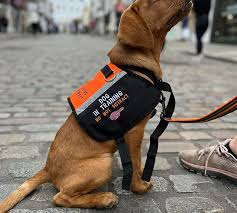The Importance of Professional Service Dog Training
Service dogs play a vital role in assisting individuals with disabilities and special needs. These highly trained dogs provide invaluable support and companionship to their handlers, enabling them to lead more independent and fulfilling lives.
Professional service dog training is essential in ensuring that these remarkable animals are equipped with the skills and behaviours necessary to perform their duties effectively. Training a service dog requires expertise, patience, and a deep understanding of canine behaviour.
Benefits of Professional Service Dog Training
- Specialised Skills: Professional trainers are experienced in teaching service dogs specific tasks tailored to the individual needs of their handlers, such as guiding the visually impaired, alerting to medical conditions, or providing emotional support.
- Public Access: Service dogs must be well-behaved and obedient in various public settings. Professional training helps ensure that service dogs remain focused on their tasks amidst distractions and unfamiliar environments.
- Legal Compliance: Professional trainers are knowledgeable about laws and regulations governing service animals. They can help ensure that service dogs meet legal requirements for public access and accommodation.
- Bonding with Handler: Through professional training, service dogs develop a strong bond with their handlers based on trust, respect, and clear communication. This bond is crucial for effective teamwork and mutual understanding.
Choosing a Professional Service Dog Trainer
When seeking professional service dog training services, it is important to select a reputable trainer with experience in working with service animals. Look for trainers who use positive reinforcement techniques, have relevant certifications or qualifications, and demonstrate a genuine commitment to the welfare of both the dog and its handler.
Remember that professional service dog training is an investment in the well-being and independence of individuals who rely on these remarkable animals for assistance. By choosing quality training services, you are not only supporting the success of service dog teams but also promoting responsible ownership and advocacy for disability rights.
Answers to Common Questions About Professional Service Dog Training
- How do professionals train dogs?
- Can I register my dog as a therapy dog?
- Can I train my dog to be an assistance dog?
- What qualifications do you need to train assistance dogs?
How do professionals train dogs?
Professionals train dogs through a combination of expertise, experience, and positive reinforcement techniques. Professional trainers utilise their in-depth knowledge of canine behaviour to design customised training programmes that address the specific needs and abilities of each dog. Training methods may include reward-based training, clicker training, shaping behaviours through gradual steps, and building a strong bond between the dog and trainer. Professionals focus on clear communication, consistency, patience, and understanding to teach dogs desired behaviours and tasks effectively. By using humane and science-based training techniques, professionals ensure that dogs learn in a safe and supportive environment, fostering trust and respect between the dog and trainer.
Can I register my dog as a therapy dog?
Many individuals wonder if they can register their dog as a therapy dog. While there is no official registry or certification for therapy dogs in the UK, dogs can undergo training to become therapy animals. Therapy dogs provide comfort, support, and companionship to people in various settings such as hospitals, schools, and care facilities. To become a therapy dog, your canine companion will need to undergo specific training and assessments to ensure they have the right temperament and behaviour for this role. Working with reputable organisations that offer therapy dog training programmes can help guide you through the process of preparing your dog for this meaningful role in enhancing the well-being of others.
Can I train my dog to be an assistance dog?
Training a dog to be an assistance dog requires a significant level of expertise, time, and dedication. While it is possible for some individuals to train their own dogs to perform specific tasks that assist with their disabilities or special needs, the process can be complex and demanding. Professional service dog training programmes are designed to ensure that assistance dogs meet specific standards of behaviour, reliability, and task performance. These programmes provide structured guidance, expertise in training techniques, and support for both the dog and its handler throughout the training process. Consulting with professional trainers who specialise in service dog training is highly recommended to determine the suitability of your dog for assistance work and to receive tailored guidance on how best to proceed in achieving your training goals.
What qualifications do you need to train assistance dogs?
To train assistance dogs effectively, individuals typically require a combination of relevant qualifications, experience, and expertise in animal behaviour and training techniques. Professional trainers who specialise in assistance dog training often hold certifications from recognised organisations or have completed specialised courses in service dog training. Additionally, a deep understanding of the specific tasks and behaviours required of assistance dogs, as well as a compassionate approach to working with both the dogs and their handlers, are essential qualifications for successful service dog trainers. Continuous education and staying informed about best practices in assistance dog training are also crucial for maintaining high standards of care and professionalism in this field.

